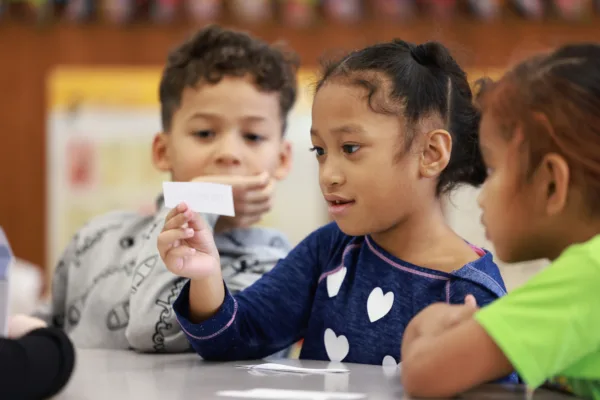Talk About Word Meanings During Phonics
Parareading Course 2: Phonics for Paraprofessionals
Let’s Watch! Lynda Knowles, a first-grade teacher at Shull Elementary in San Dimas, California, explains the multiple meanings of hatch during a lesson about the trigraph '-tch'.

Hide Video Transcript
Show Video Transcript
Students: /otch/ ... notch ...
Lynda Knowles: I heard you say /ŏ/, how do we know that's not gonna say long 'o'?
Student 1: Because, because there's no magic 'e' ...
Lynda Knowles: So because this word has 'tch' in it, we know that 'o' is gonna be short. Okay, sweetie? Awesome. We just learned something new. Fingers on the words. Ready? Go.
Students: /p/, /ĭ/, /tch/ ... pitch ... /h/, /ă/, /tch/ ... hatch ...
Lynda Knowles: Alright. Awesome job, my friends. Let's look at that word hatch. Let's talk about the meaning of that word. Okay. What does it mean to hatch?
Students: I dunno.
Lynda Knowles: Hmmm. What does it mean to hatch?
Student 1: Hatch ... I think I know ...
Lynda Knowles: So, when something hatches out of an egg that means to hatch. So like a chicken or a lizard or a snake. There's also the word "hatch" that means like, I'm gonna hatch a plan to, to scare my mom.
Student 1: Or, or, or, or like a tadpole egg.
Lynda Knowles: Yes, a tadpole egg would hatch as well. Yeah. Good job. Alright, friends, we are going to do some dictation now. So grab some pencils...
Let’s Watch! As reading specialist Dr. Elsa Cárdenas-Hagan works with English learner Emilio on the /j/ sound, she drops in short sentences to help make sure he understands the words they’re using in the phonics lesson.

Hide Video Transcript
Show Video Transcript
Dr. Elsa Cárdenas-Hagan: Today you're going to learn a new sound in the English language. All right? And we're going to play with the sounds. All right. So I want you to say this word after me. Say beanie.
Emilio: Beanie.
Dr. Elsa Cárdenas-Hagan: Very good. Now I want you to change the first sound. Just listen. Can you change it to /j/?
Emilio: "Genie."
Dr. Elsa Cárdenas-Hagan: Let's say the next word. Say kim.
Emilio: Kim.
Dr. Elsa Cárdenas-Hagan: Can you change the sound /k/ to /j/?
Emilio: Gym.
Dr. Elsa Cárdenas-Hagan: Gym. So I can work out at your school gym? Can you tell me a sentence with "gym" for your school?
Emilio: Can I go to the gym?
Dr. Elsa Cárdenas-Hagan: Can I go to the gym? That was an excellent sentence. My goodness. Can you say the word bell?
Emilio: Bell.
Dr. Elsa Cárdenas-Hagan: Can you change the /b/ to /j/?
Emilio: Gel.
Dr. Elsa Cárdenas-Hagan: What did you put in your hair this morning?
Emilio: Gel.
Dr. Elsa Cárdenas-Hagan: Gel. En español es gel ¿verdad?


